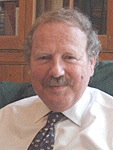
Action Research Professor of Neurology
Wellcome Trust Centre for Human Genetics
Oxford Neuroscience
University of Oxford
Ebers Group
Nuffield Dept. of Clinical Neurosciences (Clinical Neurology),
University of Oxford, Level 3, West Wing, John Radcliffe Hospital,
Oxford OX3 9DU, United Kingdom.
E george.ebers@clneuro.ox.ac.uk
Publications
PubMed: Ebers GC
Videos
Professor George Ebers' Awareness talk on the effects of environmental factors (such as exposure to sunshine) and genetics on MS
Sunshine and MS - part 01 by MSSociety on Aug 22, 2007 - 8:00 min
Sunshine and MS - part 02 by MSSociety on Aug 24, 2007 - 8:00 min
Inheritance of MS... by MSSociety on Sep 7, 2007 - 6:30 min
Genetics in MS by MSSociety on Mar 14, 2008 - 8:22 min
Vitamin D and genetics in MS by MSSociety on Jun 3, 2009 - 9:45 min
Vitamin D Deficiency Part 1 by MSSociety IRELAND on Sep 19, 2011 - 9:11 min
Vitamin D Deficiency Part 2 by MSSociety IRELAND on Sep 19, 2011 - 9:58 min
Vitamin D Deficiency Part 3 by MSSociety IRELAND on Sep 19, 2011 - 10:17 min
Vitamin D Deficiency Part 4 by MSSociety IRELAND on Sep 19, 2011 - 5:31 min
Research Overview
Although most cases of the common neurological disease multiple sclerosis (MS) occur only once within a family, some families have two or more members with MS. We have carried out genetic studies on the DNA of individuals within these families including those unaffected as well as affected. A stretch of DNA shown to be present more often in those affected compared to those unaffected was discovered several decades ago. This is a particular variation of a gene within the major histocompatibility complex (MHC) which has many functions relating to immunity. The particular variation initially detected was HLA-DRB1*15 which is the strongest genetic association to MS.
Prof Ebers has led a study investigating the genetic susceptibility to MS and other possible risk factors for over 30 years. Various members of the Ebers group, past and present, have collected DNA and life-style information from Canadian patients and their families and we now have over 35,000 DNA samples which we have used to answer many questions about the occurrence of MS.
>> more
Terms of Use
